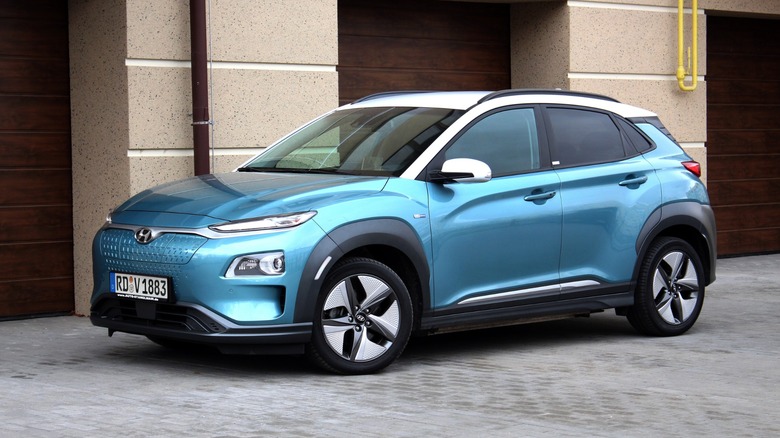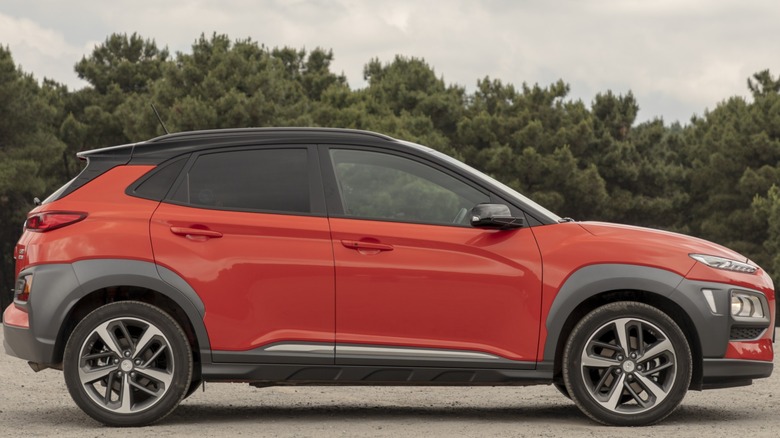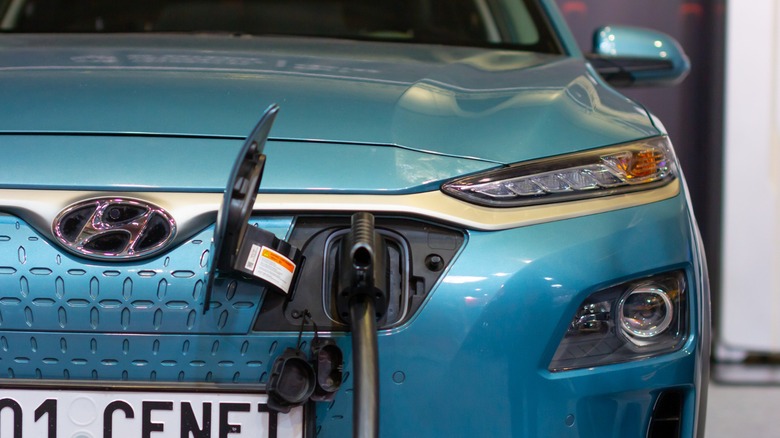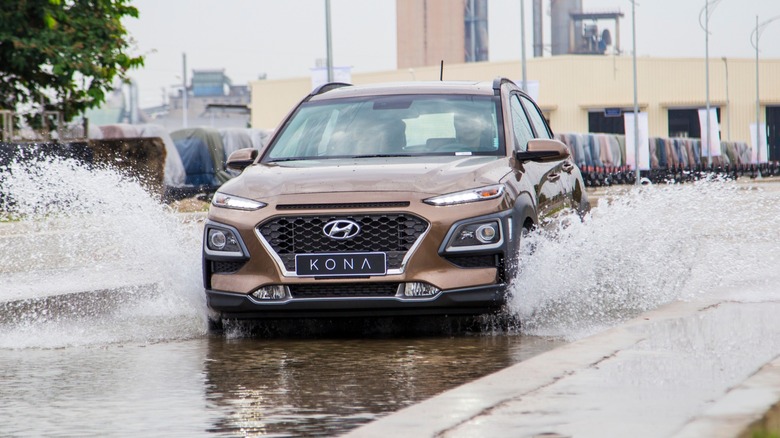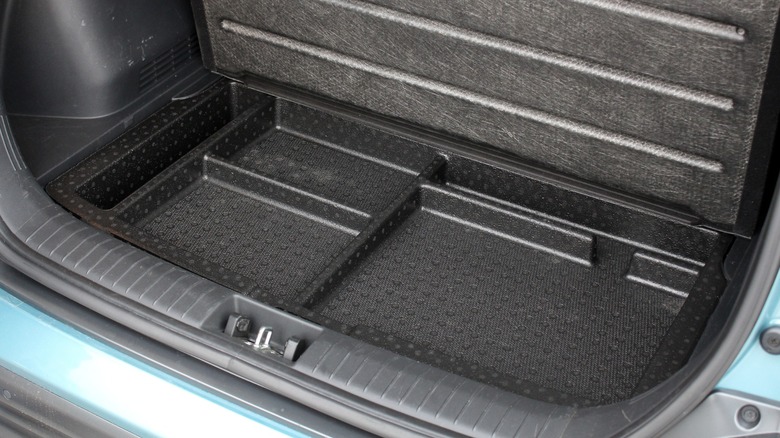5 Of The Biggest Regrets Customers Have After Buying The Hyundai Kona
One thing America loves is a good crossover. So, as you can imagine, when the Hyundai Kona came onto the scene in 2018, it made quite the entrance. It was pretty good-looking, the price felt like a bargain, and most importantly, it was actually fun to drive. Over the years, Hyundai has expanded the lineup with new generations, high-performance N models, and even fully electric versions. Naturally, it went on to become one of the most successful vehicles in Hyundai's history. Since its debut, it has sold more than 2 million units.
With numbers like that, you'd imagine that most owners have been completely satisfied with their purchase. Some certainly are. For instance, the 2024 Hyundai Kona has been described as a small crossover that checks all the big boxes. Even better, the 2025 Kona N is one of Hyundai's fastest cars, ranked by top speed. But despite the glowing reviews, there have been recurring issues across multiple models that have left others frustrated, and, in some cases, genuinely worried about their safety.
Admittedly, some of these problems are limited to specific years and trims. However, if the Kona is a car you're thinking about buying, you should have all the facts. That way, you know what to generally expect. That said, if you go looking for reviews, you'll notice a divide in opinions. Some owners swear it's the best car they've ever had, while others insist it's been their worst purchase yet. And if you asked the latter, here are some of the things they'd tell you went wrong.
Early Kona engines failed catastrophically
The early Konas with the base 2.0-liter engine had a pattern of failing way earlier than they should. And when we say failing, we mean catastrophically. Engines suddenly started ticking rather loudly, stalling out of nowhere, or just seizing up completely and leaving owners stranded on the highway. By the way, for some owners, this was even before hitting the 50,000 mile mark. On the Hyundai Kona Owners Facebook group, one owner shared her experience: "I got my Kona 2 years ago and I love it but regret getting it at the same time as it needs a new engine already."
The really alarming part is that these failures often occurred without any warning. Owners who stayed on top of oil changes, followed the maintenance schedule to the letter, and took care of their cars still ended up needing complete engine replacements. It didn't matter how diligent they were because the problem was baked in from the factory. Hyundai eventually recalled thousands of Konas from the 2019 to 2021 model years once they figured out that some defect in the piston oil rings was damaging the engines.
In the NHTSA recall notice, the defect could also trigger leaks, meaning there was also a real risk of a fire accident. Now, Hyundai did offer to inspect and replace engines at no cost, which is something. But spending weeks without your car can be pretty annoying. Sure, you might get a loaner in that period, but what's even more annoying is how much this tanks the resale value if you decide to sell later. Not many people are happy to buy a car that's been recalled.
The dual-clutch transmission was unreliable
"Hyundai Kona" and "dual-clutch transmission" appearing in the same sentence is rarely ever positive. And that's interesting because on paper, the DCT paired with the 1.6-liter turbocharged engine, was supposed to deliver sporty, quick-shifting performance. But drivers noticed their cars would hesitate or shudder when accelerating from a stop, with noticeable turbo lag and delayed response. In stop-and-go traffic, the transmission could be particularly jumpy and difficult. But the problem with the Hyundai Konas equipped with DCT wasn't just about how they drove at low speeds. The transmission could just randomly shift to neutral and lose power entirely while on the road.
One owner reported that they'd had their Kona for less than 3 weeks and had only driven it 1,100 miles before it failed. The entire transmission had to be replaced under warranty. And they're not alone in this experience. Across multiple forum threads, you'll find other owners who had their transmissions replaced within the first few thousand miles. Considering this issue with the Kona also affected other Hyundai and Kia models, it's safe to say there was an inherent flaw with how the transmission was designed.
Hyundai later recalled over 50,000 vehicles. But that didn't stop frustrated customers from filing class-action lawsuits, prompting Hyundai to ultimately discontinue the 7-speed DCT in favor of an 8-speed automatic, which now appears in the redesigned 2024 Kona. For many who still own models with the problematic transmission, it does raise a fair question: if major components are failing before 10,000 miles, what are the chances that Hyundais reliably make it past 100,000 miles?
Safety recalls turned the Kona Electric into a liability
Believe it or not, the biggest problem with EVs is price. And rather remarkably, Hyundai is one of the automakers trying to fix that gap by offering the Kona Electric at a relatively affordable price point. But as of this writing, it's one of 2025's worst car deals, according to Consumer Reports, and with Hyundai, it appears that the recall notice never ends.
In late 2020, Hyundai globally recalled over 4,000 models of 2019 to 2020 Kona EVs because manufacturing defects in the LG battery packs could lead to fires. There were actual cases of reported fire accidents across Canada, Europe, and South Korea. So, owners in the U.S. were advised to park outside and away from buildings until a fix was available. The fix, however, required replacing the entire battery pack, and that was a complex job that left some waiting months for replacement batteries. It didn't help that communication from Hyundai during this process was poor. As a result, some owners filed a class-action lawsuit over the devaluation of their cars and the handling of the recall.
But the battery isn't the only problem. Some of these 2019 to 2020 Kona EVs also make an ominous grinding noise (which owners call the wheel of fortune noise) that often turns out to be a symptom of reduction box failure. When this happens, the entire motor and reduction gear might need to be replaced. And as we've seen even with the gas models, these problems tend to occur relatively early. For some, that's just a few months into owning the vehicle.
The drive can be noisy and uncomfortable
On a test drive, most people barely notice this problem. And to be honest, a lot of people don't mind it much. However, there's a good number of people who'd describe the Kona as a noisy vehicle. One owner who switched from a 2020 Santa Fe noticed the difference immediately. Their Santa Fe was fairly quiet, but the Kona Ultimate 1.6T just wasn't. They admitted the car was great, but the cabin noise can be pretty unbearable on the highway without music playing — or some modifications.
Even EV drivers have noticed strange noises, which is surprising considering electric cars are supposed to be quiet. One described a winding-down sound during regenerative braking at around 65 mph with regen set to level 3. It reminded them of downshifting a manual car into third gear at high speed, and it happened every single time they lifted off the accelerator. Another driver reported a high-pitched tone that started about a minute after parking and shutting down their 2024 Kona Electric. They could tell it was coming from somewhere under the trunk, but even the dealership couldn't figure out what the problem was.
The real frustration is not knowing what's normal. People who know their cars (the kind who can tell a transmission issue from sound alone) can't quite figure out what's normal with the Kona and what isn't. Some assume it's just how the car works, but there are others who worry it might be a sign of an underlying engineering problem. And given the Kona's track record with component failures, that's not an unreasonable concern.
Cargo space and interior quality is quite disappointing
So far, most of the problems we've highlighted seem to show up in the first-generation models. Hyundai, however, has been taking notes and making some changes. We say that because the second-generation 2026 Hyundai Kona, for instance, is now considered one of the best new SUVs you can buy in 2025. But if there's one thing almost every first-gen owner brings up, it's how little space there is. That compact size that many people loved came at a cost: a pretty small cargo area.
Because there's not much room, things like big grocery runs or packing for a weekend getaway are way more frustrating than they should be. Many owners who bought it as their main family car often end up wishing they'd gone a little bigger—say, with a Tucson, for example. Then there's the interior quality, which is another major letdown. The Kona uses plenty of hard plastics insid,e which can be pretty annoying, and the build quality in general just isn't satisfactory. For instance, some owners have noticed that the dashboard and doors start to make rattling noises.
Now, you'd think it's something that develops with age, but many owners would tell you that's not the case. One 2025 Hyundai Kona owner who's only put 4,000 miles on their vehicle noticed a rattling noise from the passenger side. And another 2025 Kona confirmed they also get a similar rattling whenever they drive over bumps. That said, Hyundai seems to be paying attention. According to Car and Driver, the second-generation Kona scales back on design for a roomier cabin and noticeably larger cargo space.
How we compiled this list
We started by reading through thousands of owner experiences across Hyundai Kona forums, Reddit threads, and Facebook groups, taking note of recurring problems. If so many people across different platforms reported the same problem, it was definitely worth looking into. From there, we turned to Consumer Reports. They conduct reliable surveys across thousands of owners, and their data helped us see how the Kona holds up over time. We also reviewed official recall records from the NHTSA, as well as class-action lawsuit filings for even more context.
Every owner's story featured in this article comes directly from forum discussions, Facebook posts, and other credible automotive news outlets where Kona drivers shared their real-world experiences. We focused on problems specific to certain model years when it made sense. For example, the 2.0L engine failures mainly affected 2018 to 2019 models, while the Kona Electric battery recall was for 2019 to 2020 EVs. We also made sure to highlight any relevant improvements Hyundai made, like replacing the dual-clutch transmission with an automatic in the 2024 redesign and expanding the Kona's size for 2026.
It's worth noting that not every Kona owner runs into these issues. Many genuinely love their cars. Still, we found these recurring problems serious enough that potential buyers should know about them. You'll see that these are issues that affect daily usability, safety, and long-term satisfaction, and they're not just minor quirks that come with owning a vehicle. Nonetheless, since automakers are constantly updating and improving their products, we recommend checking the most recent owner feedback before deciding which year's Kona to buy.
